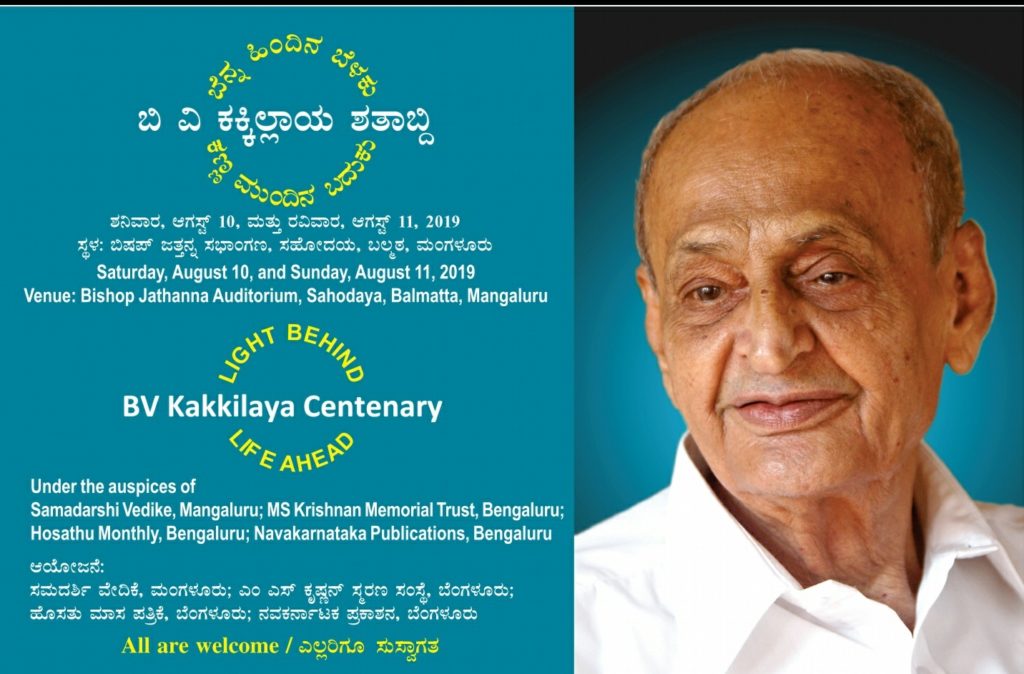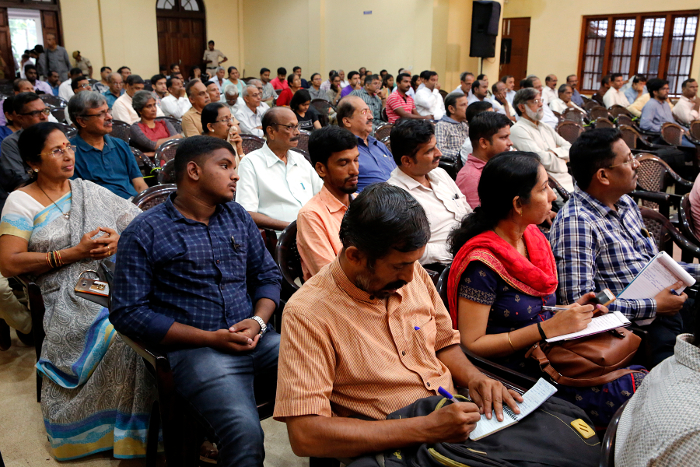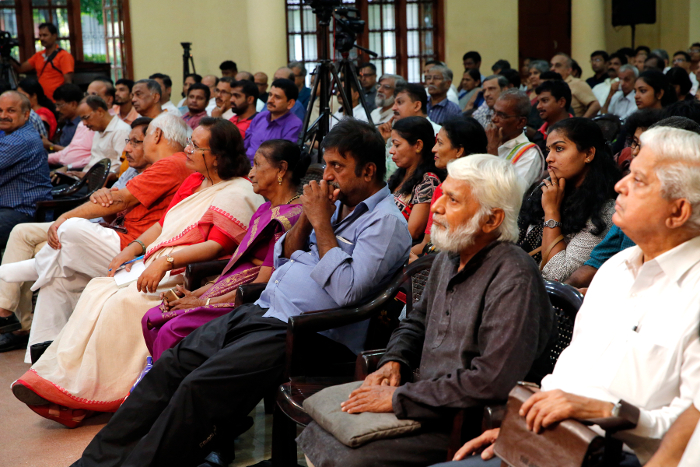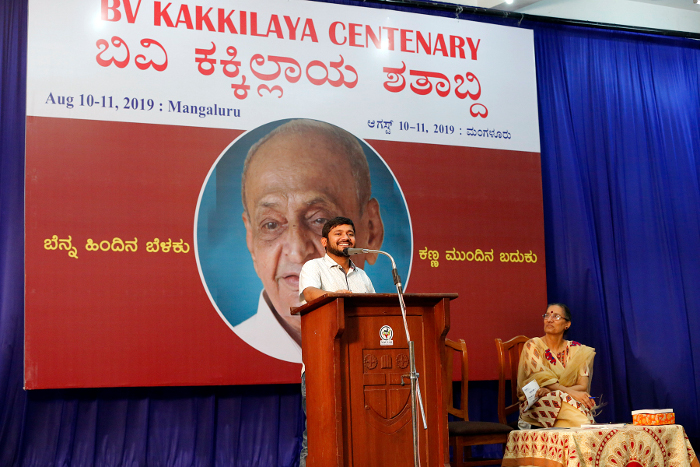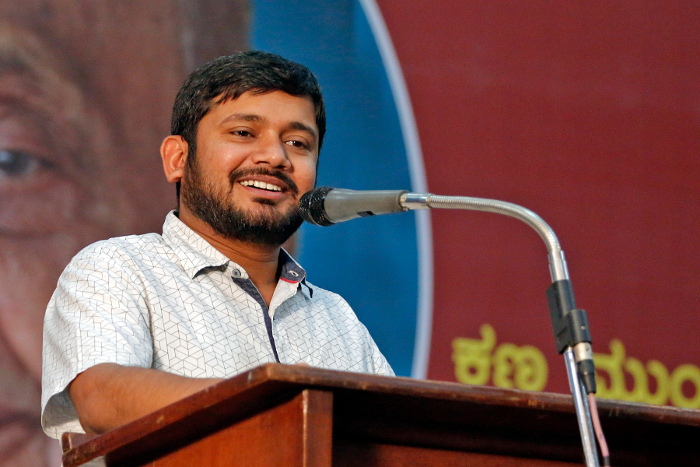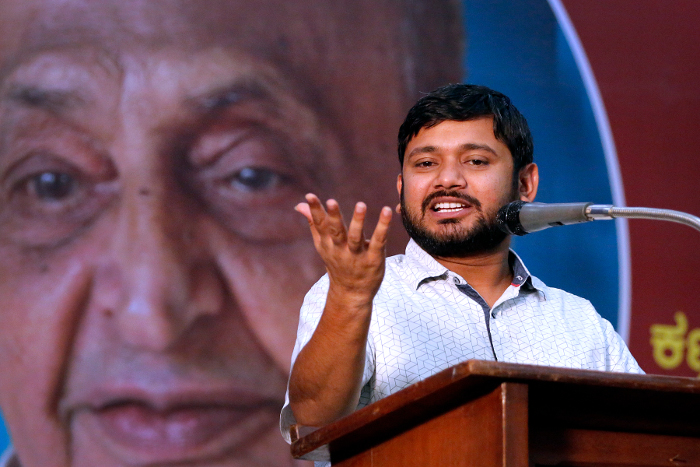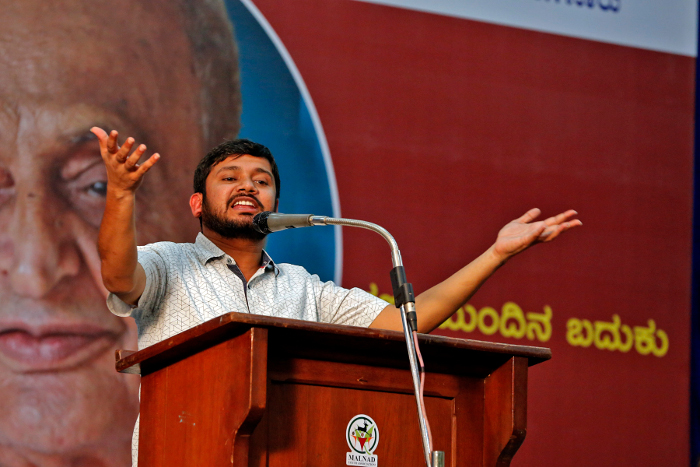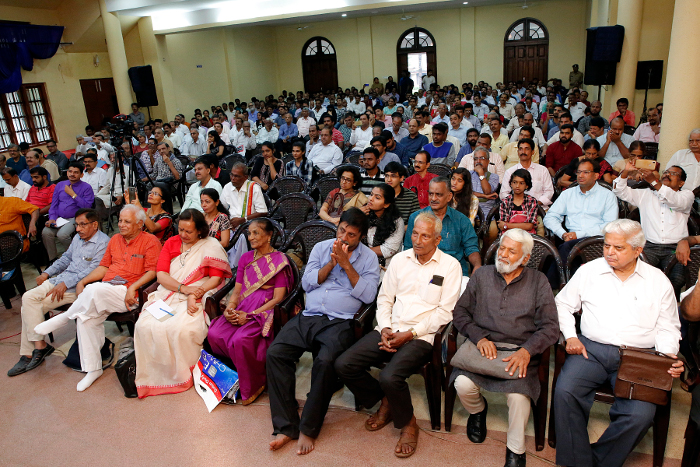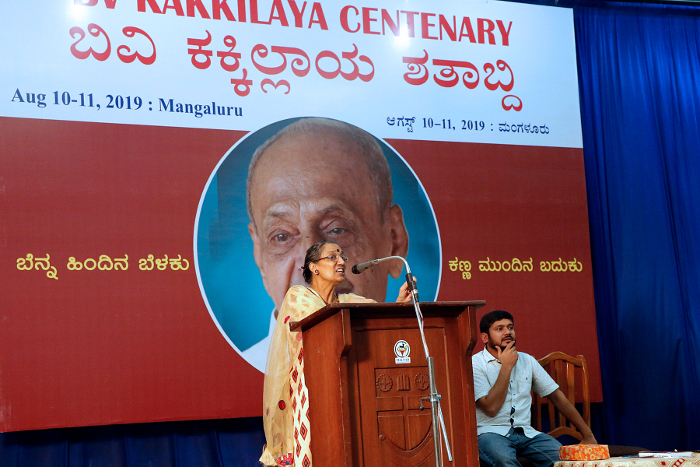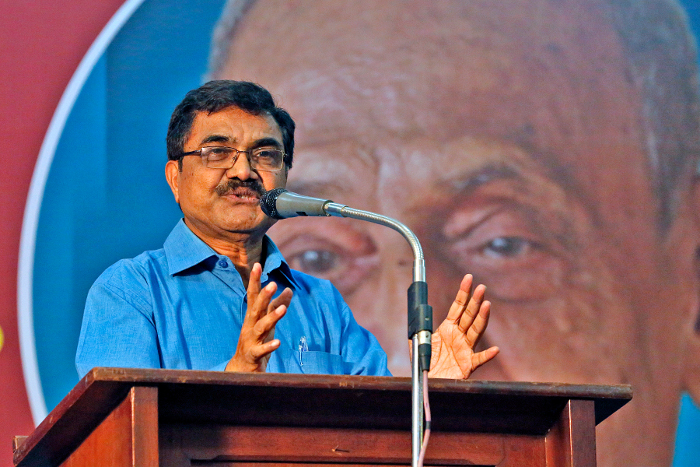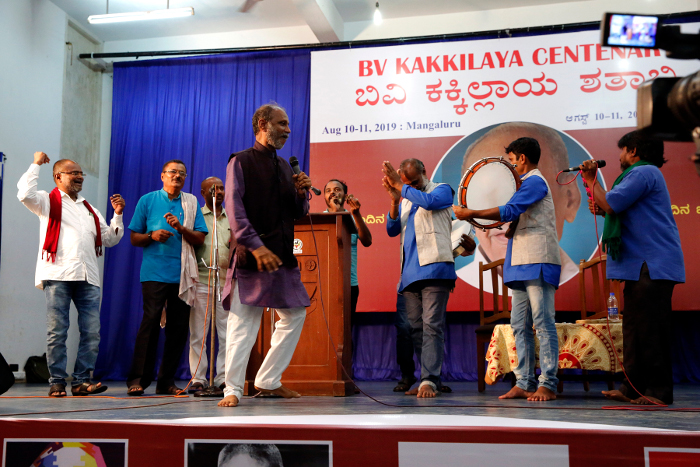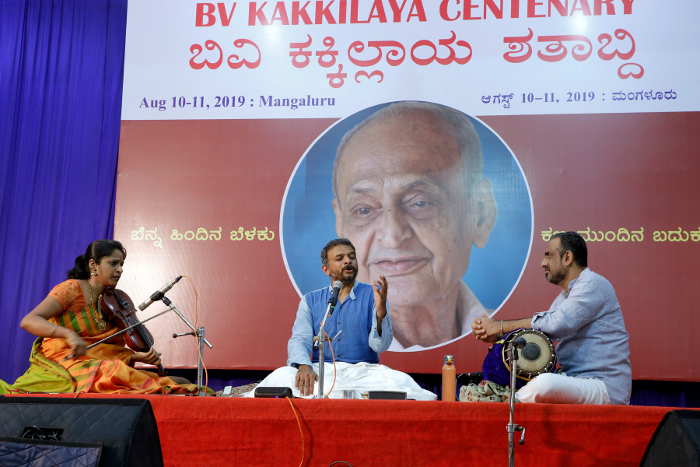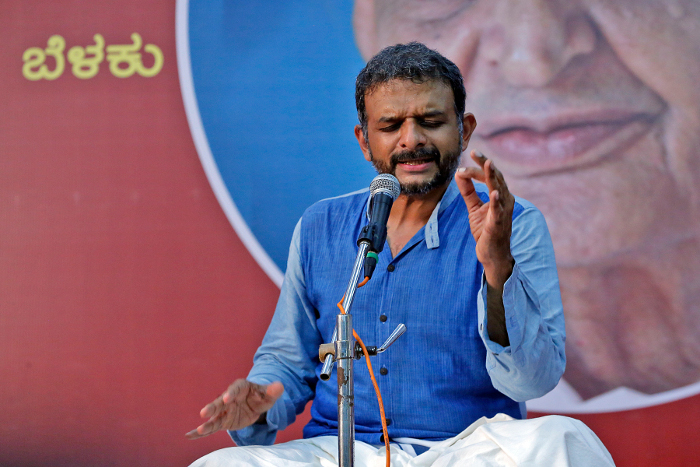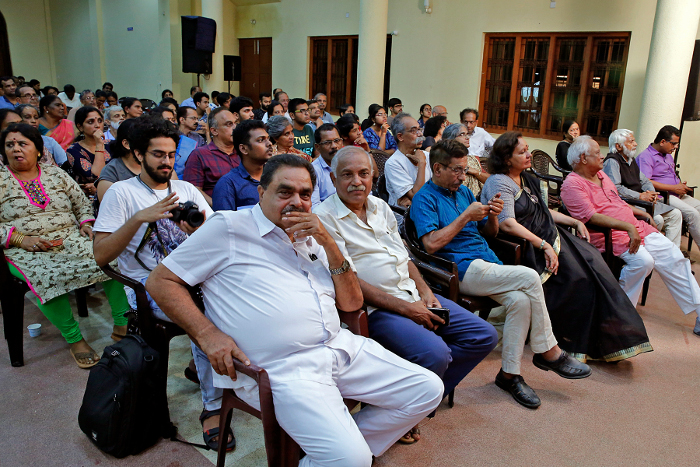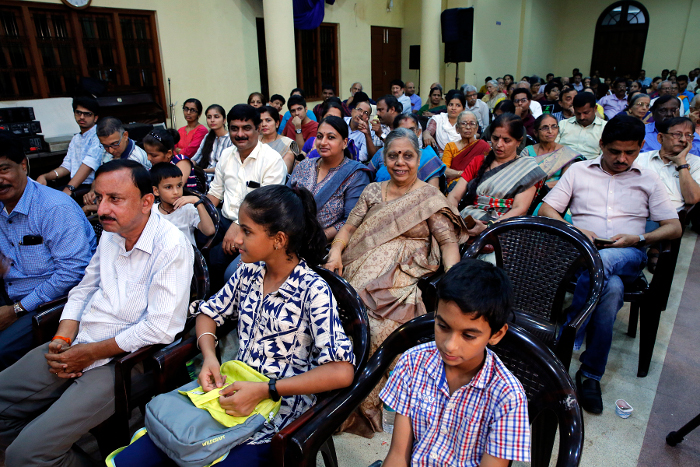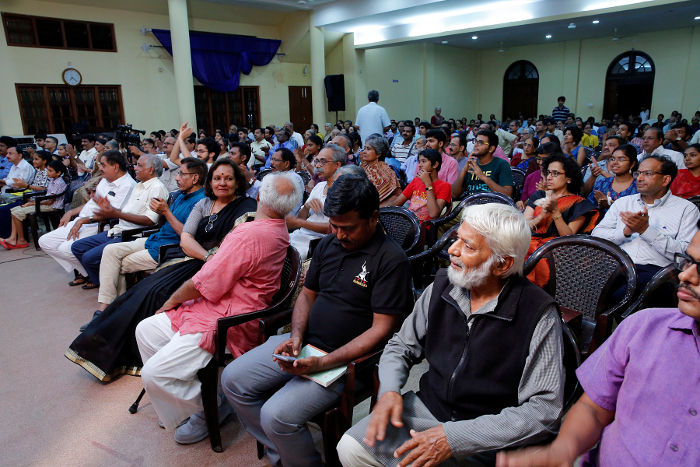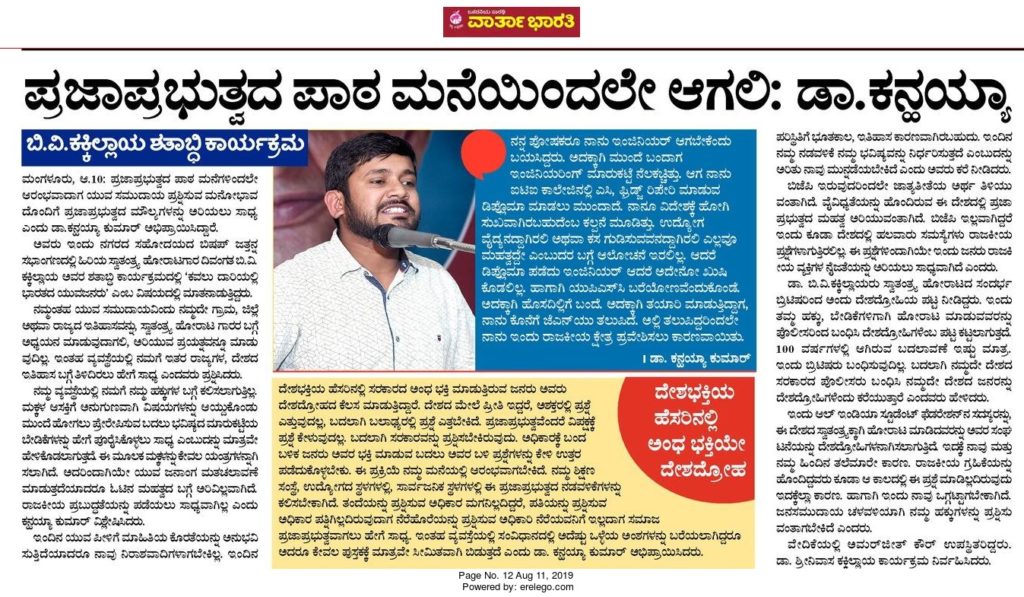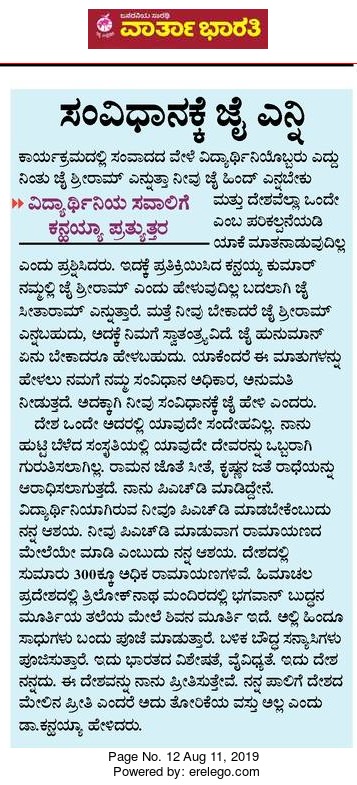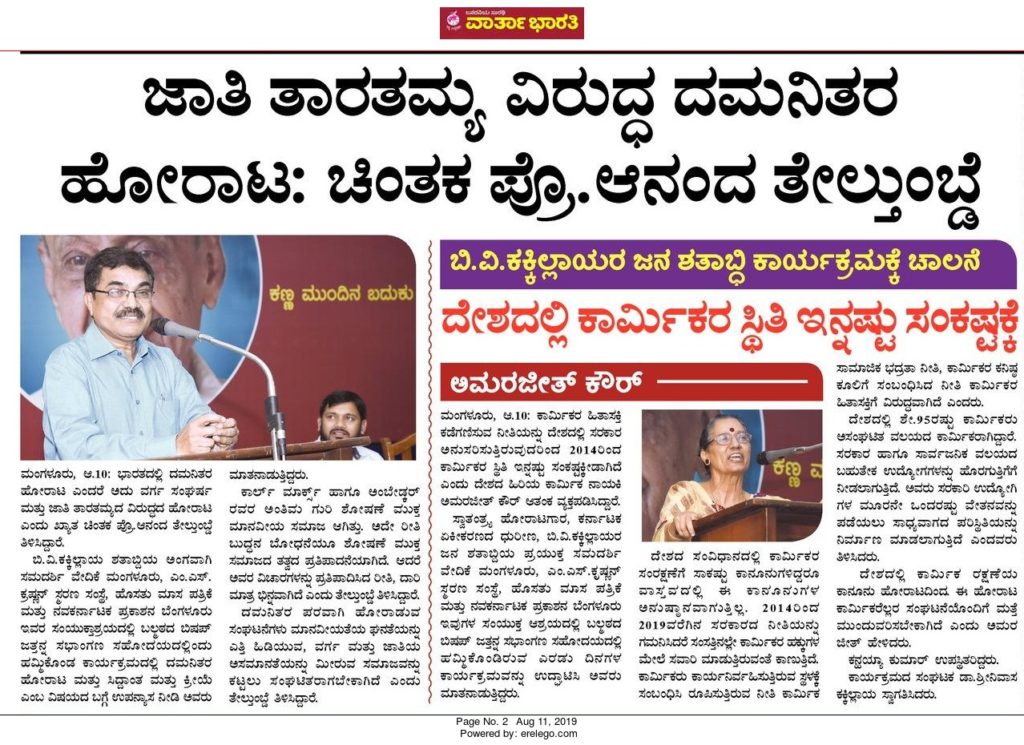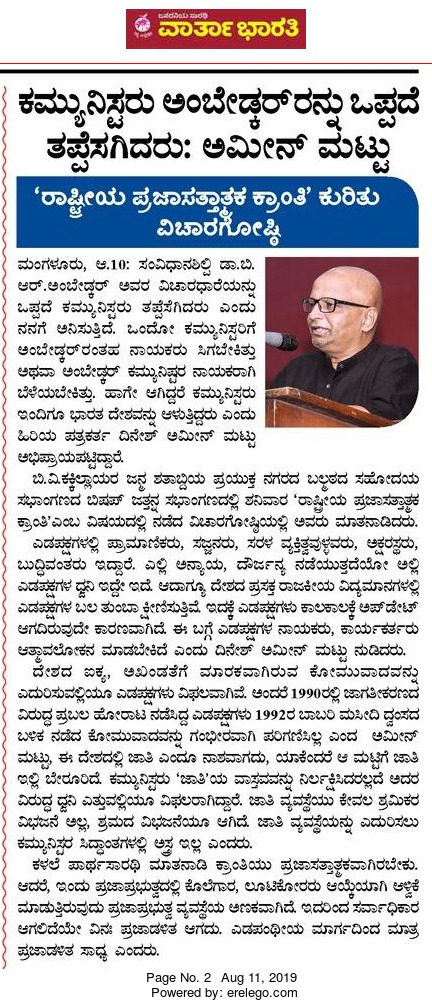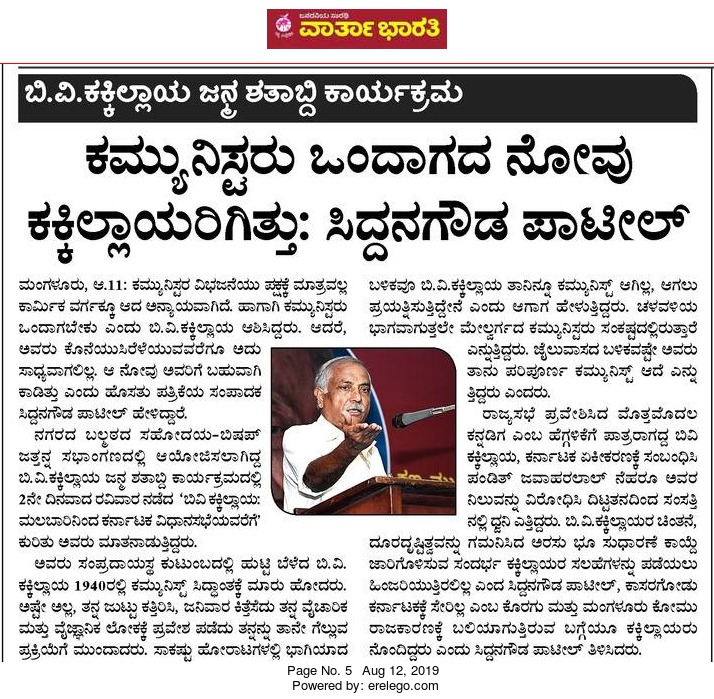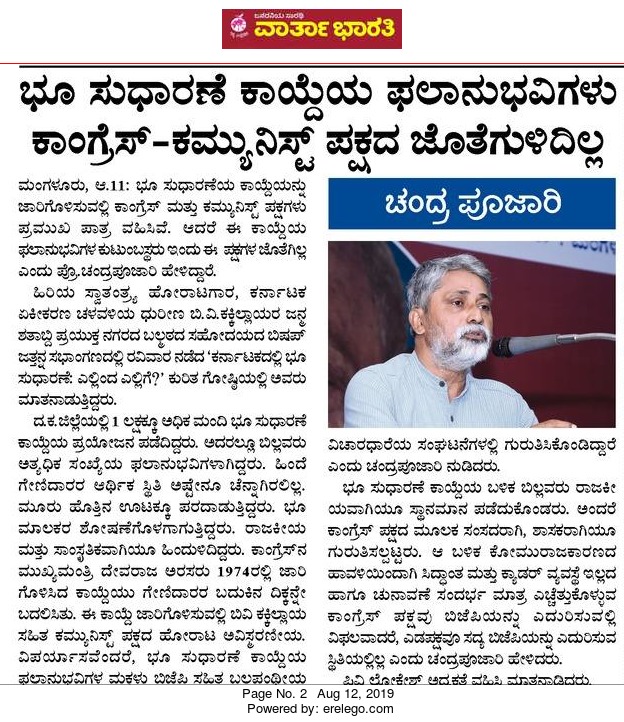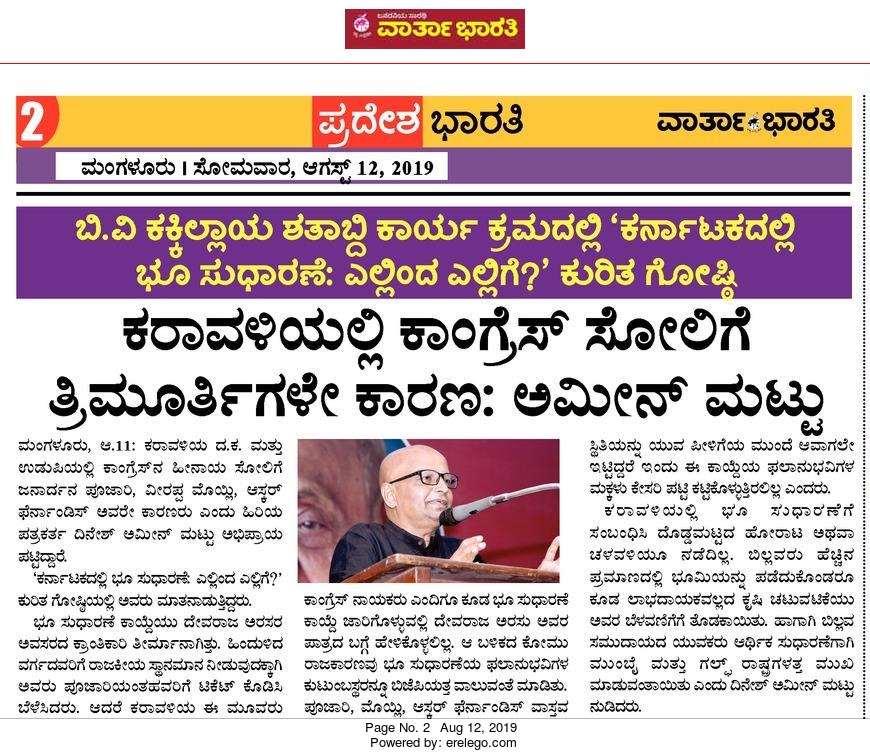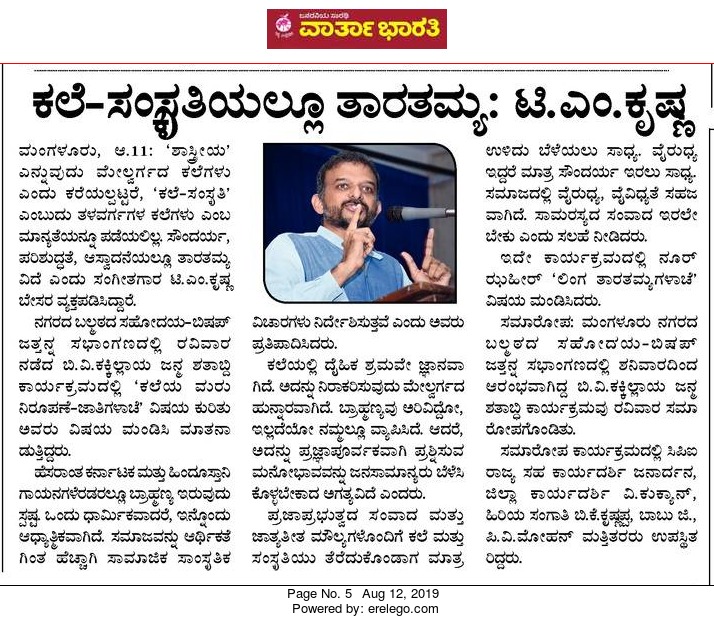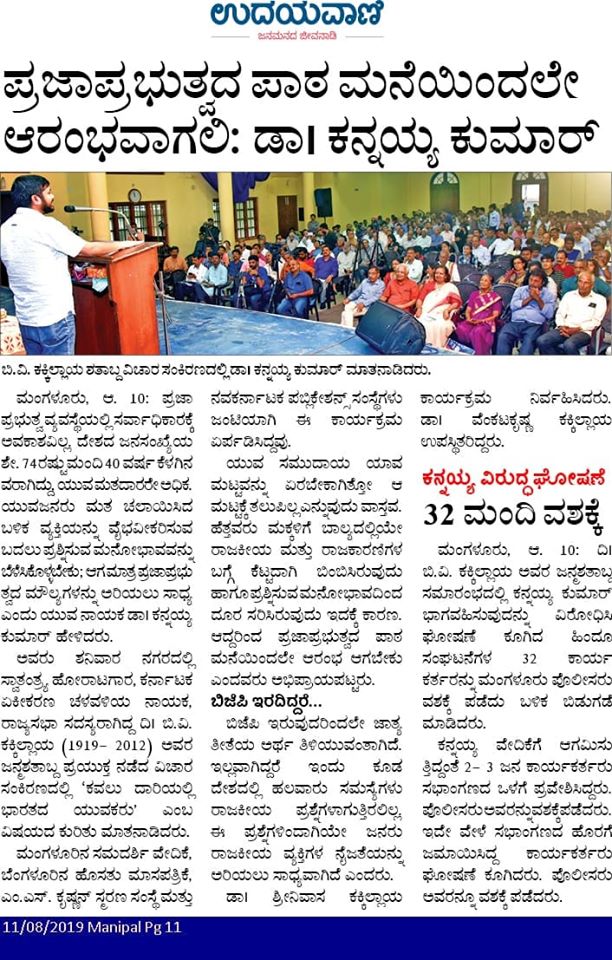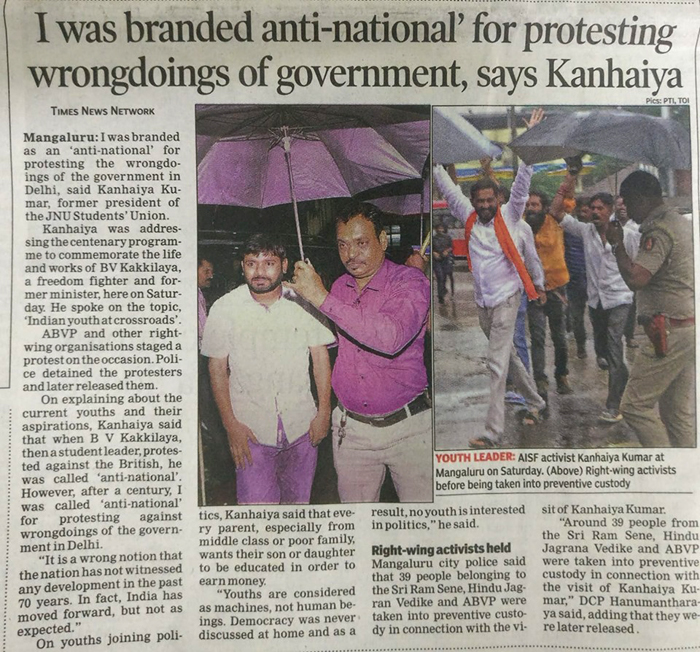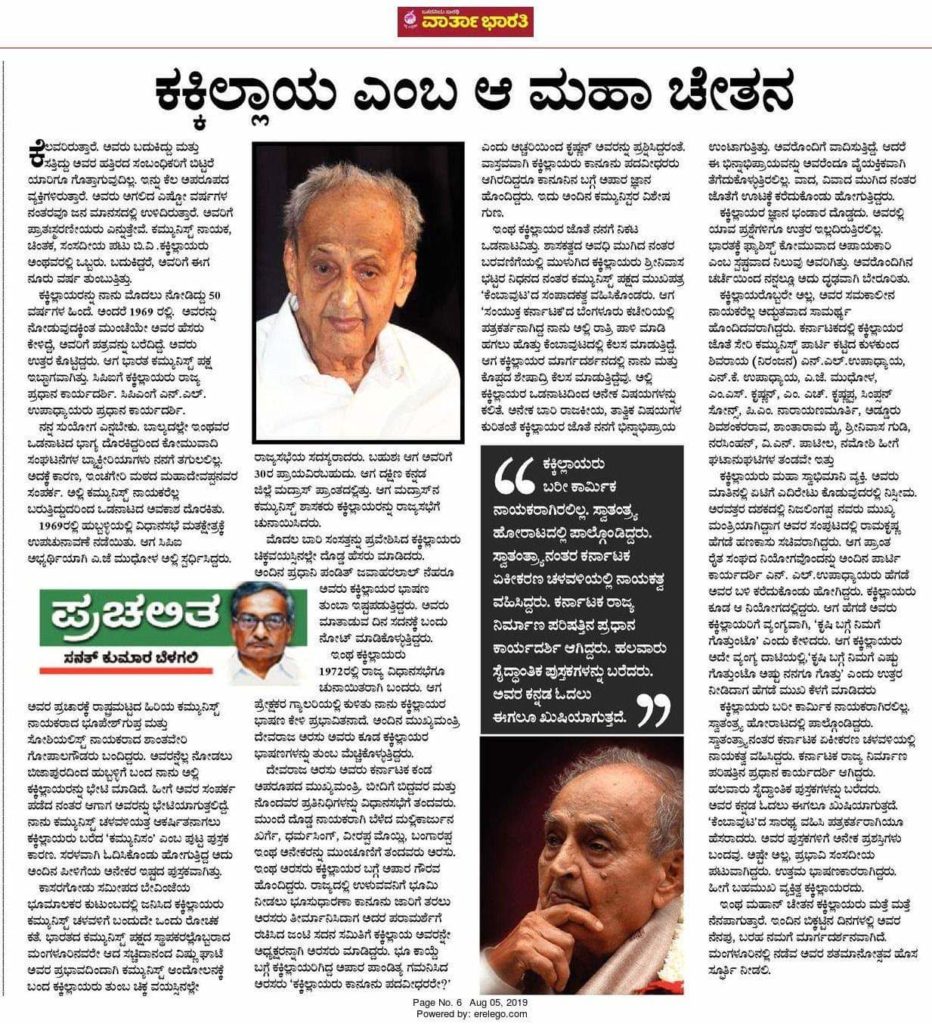BV Kakkilaya Centenary at Mangaluru on Aug 10 and 11, 2019
Braving all the odds, the Centenary Programme commemorating the life and works of Com. BV Kakkilaya (1919-2012), was held in Mangaluru on August 10 and 11, 2019. Com. BV Kakkilaya had joined the Communist Party of India in 1940, as a student at the St. Aloysius College in Mangaluru during 1939-42, having been the secretary of AISF, and later AITUC and CPI Karnataka state. He was jailed several times, starting with the Quit India movement, up to 1962. He was sent to the first Rajya Sabha (1952-54), to represent Karnataka (then Mysore) from the Madras Provincial Assembly, and was elected to the Karnataka assembly twice, in 1972 and 1978, from Buntwal and Vittal constituencies. He was a leader of the Karnataka reunification movement, and had led a team of CPI cadres from Mangaluru during the Goa liberation struggle. He was also an award winning writer in Kannada.
The Centenary Programme was inaugurated by Com. Amarjeet Kaur, General Secretary of AITUC, by releasing the second revised edition of Com. BV Kakkilaya’s autobiography titled Bareyada Dinachariya Mareyada Putagalu (Unforgettable Pages from Unwritten Diary).
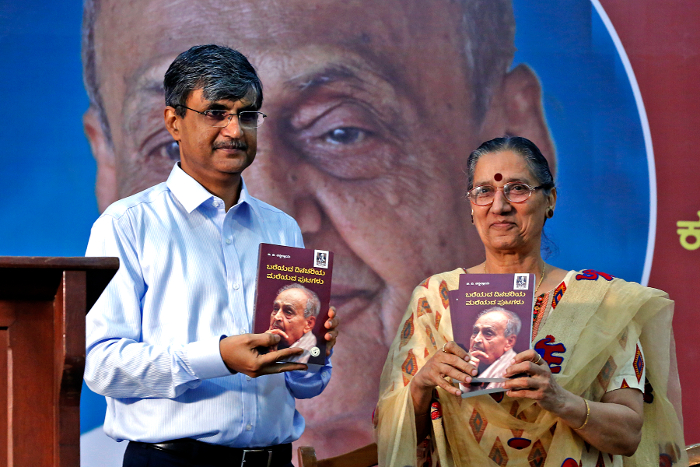
In her inaugural address, titled ‘Role of the Working Class Movement in India’s Freedom Struggle and Nation Building’, Com. Amarjeet Kaur narrated the origins of AISF, AITUC, CPI and IPTA and explained their valiant role in the freedom struggle. She stated that the Communists under these mass organisations not only fought against the British colonialism, but also against the oppression on and exploitation of the peasants and workers, organizing mass struggles that played a stellar role in the freedom struggle. Such struggles, and the strength of the Communists as the principal opposition in the first years of India’s parliamentary democracy, she pointed out, pressurized the then governments to formulate policies that were secular, liberal, democratic and pro-people. She also pointed out that the RSS, which was also founded in the same year, 1925, as the CPI, not only ditched the freedom struggle, but worked for polarizing the people and spreading communal hatred, abetting the division of the country into two, culmination in the assassination of Mahatma Gandhi, and that the same forces are now continuing and building their divisive and fascist agenda posing grave danger to our nation. She added that the condition of the working class in the country has become pathetic since 2014 due to the policies of the Central government. She lamented that the laws aimed at protecting the interests of the working class, enacted owing to the struggles of the working class, are now seeing ineffective implementation. Stating that 95% of the working force of the nation is in the unorganised sector, she said most of the jobs in government and public sector undertakings are on contract basis, creating a situation wherein these workers do not get even a 1/3rd of the pay which government employees get. While in the pre-independence days the people and workers came together forgetting all the ideological differences to fight for the freedom, after independence there started several central trade unions and because of which the workers were scattered to some extent, said Com. Kaur, and recounted the stellar role played by Com Gurudas Das Dasgupta in bringing unity among all the central trade unions and independent unions to fiught together for the common causes of the workers. She reminded that the present Government is trying to dilute the hard earned rights of the workers and such moves are being fought valiantly.
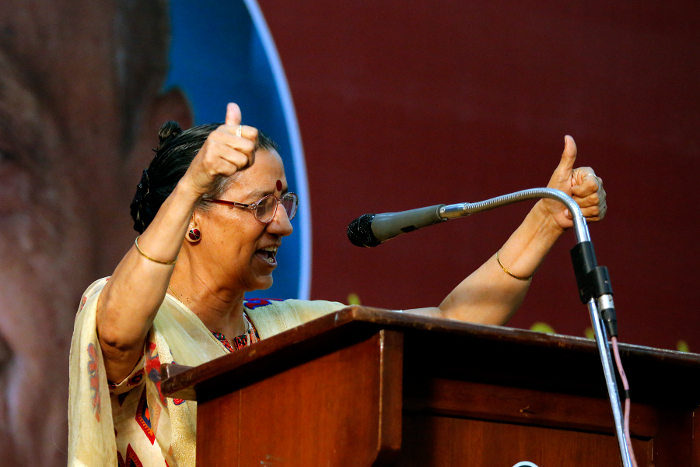
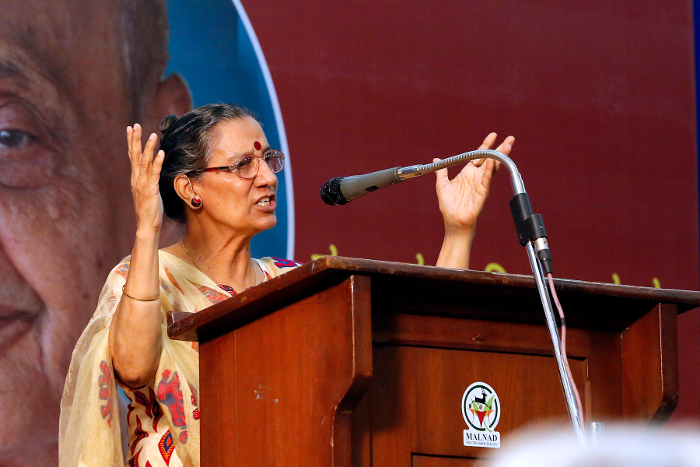
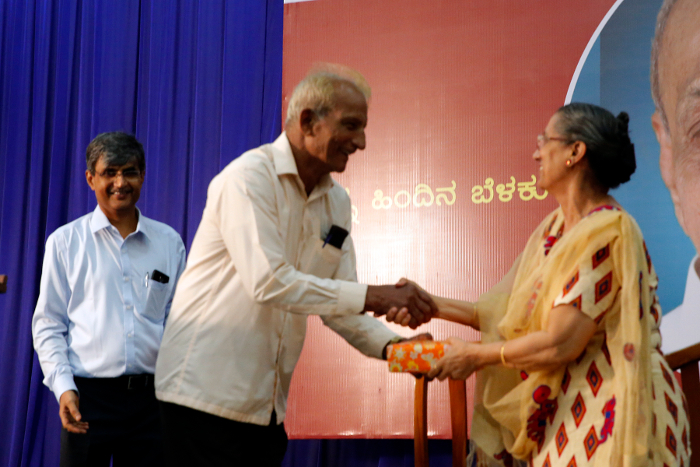
The first discussion after the inauguration was titled ‘Indian Youth at Crossroads’. Making his first ever presentation in Mangaluru in front of a huge, very enthusiastic gathering, Com. Dr. Kanhaiya Kumar dealt at length on the topic, and explained the current crisis that’s affecting the youth of our country.
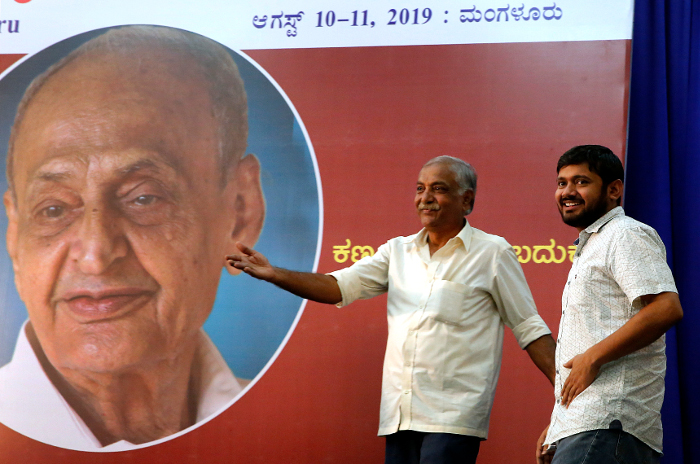
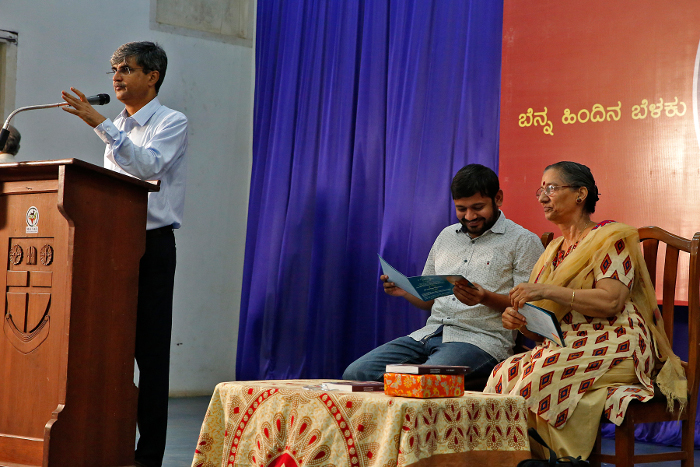
Drawing parallel with Com. BV Kakkilaya, Com. Kanhaiya said that whereas Com. Kakkilaya was jailed by the British for participating in the freedom struggle, the present government of free India is jailing activists like himself for raising their voices against the anti people policies, and that in both instances, the governments chose to term these people as anti nationals. Explaining the crisis of capitalism, Dr. Kanhaiya Kumar drew attention to the fact that the technological revolution has lead to mass production of goods with the use of smaller and smaller workforce, leading to crisis of profits, which in turn have led to liberalization and globalisation, and at the same time, protectionism. Such crisis ridden situation has resulted in fragmentation and separation of the working masses, with workers, peasants, women, students and youth, marginalised and minorities having had to go their own ways and to fight their own smaller battles. The fundamentalist forces that are inimical to new knowledge and scientific advancement, he pointed out, are always at the forefront of using the latest of the very same technology that they shun. Such contradictions help these forces to wage emotional and perceptional propaganda, misleading the youth away from their real issues. He said that the attacks on public universities are a part of the agenda to break bigger institutions while also creating a perception that such universities that impart knowledge, and prepare the youth into intellectuals who pose tough questions, as breeding grounds of anti nationals. He urged the youth to pose tough questions to the powers, and said that singing paeans to the powers in blind faith, in fact is an act of being unpatriotic. Dr. Kanhaiya Kumar emphatically stated that like day and night, democracy, liberty and secularism shall remain forever, and the darkness if any, can only be temporary. He called upon the youth to practice democracy in their own homes, by valuing their spouses, and taking their own decisions about courses and careers. Such democrats, he asserted, would naturally uphold and fight for democratic values.
Com. Amarjeet Kaur, in her response to Dr. Kanhaiya’s presentation, narrated the struggles waged by the AISF and other mass organisations and her own experiences as a member and office bearer of the AISF, NFIW and AITUC. She urged the youth to follow the ideals of democracy, secularism and progressive thought, and to maintain sustained vigil and struggle for these values.
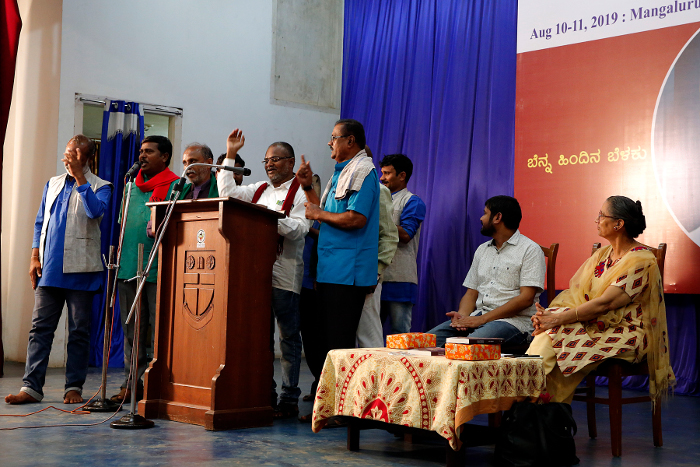
During the interaction that followed, many questions were asked about the Indian communists vis-à-vis others, the cultural and other spaces that need to be reclaimed by the communists, the new ideas for Indian politics, particularly the left, etc., and Com. Kanhaiya answered them with élan. A question asked by a girl, who claimed herself to represent the students and youth of Mangaluru, however, was answered by Dr. Kanhaiya in such a way, that it instantly became madly viral all over the media, with millions watching the video, and the conversation transcribed into many languages.
The young girl started her question with ‘Jai Sriram’ and asked Com Kanhaiya why he cannot preach one nation, one student power, one polity, one unity policy. Com. Kanhaiya replied: ‘You are preaching one. But I am born of the interaction of two people i.e., my father and my mother. There is no controversy about our nation being one. Our nation is bound by one constitution which has got more than 300 articles. The constitution provides for one parliament which has two houses. Each house has several elected members. So whatever we follow or whatever we do has plurality or diversity. You may say ‘Jai Sriram’ or ‘Jai Hanuman’ or anything you like to say. The constitution has given you liberty to say whatever you want. So please say ‘Jai’ to our constitution also.’
Dr. Kanhaiya continued: ‘I am born in Begusarai which is included in Mithila province. In Mithila every year Rama’s marriage is arranged. During this festival, several people from Ayodhya came over to Mithila with Rama’s attire. They are welcomed with abuses by locals. This is the practice of our place. It is our culture. In our place we do not name the Gods singly. We always say Seetharam or Radhekrishna and like that. There are more than 300 Ramayanas written by different people in different regions. In Lahol district there is a different Ramayana. In this version, Ravana is the father of Seetha. Rama loves Seetha and marries her. Ravana was against it and thus the war between them. In Himachal Pradesh there is a Triloknath Temple. There the idol of Shiva is on the head of Buddha. Here both Buddhists and Hindus pray. India is a big nation with a lot of diversities. To know this we have to travel the whole of India. Then only you will understand the beauty of it. When we think of the broadness of India it makes us to feel how small we are. If you go to any part if India you will have different experiences and thrills. You and I love this country. We love our mother. But if anybody come to you with a flag and ask you to shout a particular slogan and ask you to show your love to your mother, I am sure you will not do it. This country is mine. I love it. But love is not for exhibition. I always carry it in my heart and move forward.’ The reply was received with thunderous applause and the video has since gone viral all over, with more than 1 crore people watching it and there were thousands of congratulatory comments.
Other links:
Prajavani with Kannada sub titles:
- https://www.facebook.com/brutindia/videos/423535411597598/
- Watch: Kanhaiya Kumar’s viral video explaining unity in diversity – https://indianexpress.com/article/trending/viral-videos-trending/kanhiya-kumar-explaining-one-india-notion-unity-in-diversity-in-mangalore-is-going-viral-5899311/
- Girl Greets Kanhaiya With ‘Jai Shri Ram’, Here’s What He Replied – https://www.thequint.com/news/politics/kanhaiya-kumar-mangalore-student-jai-shree-ram-one-nation-unity-in-diversity
- https://scroll.in/video/933686/this-video-of-kanhaiya-kumar-has-gone-viral-he-explains-why-diversity-is-what-unites-india
- Kanhaiya Kumar’s Reply to Woman Who Asked Him to Say ‘Jai Hind’ is Going Viral : https://www.india.com/news/india/kanhaiya-kumars-reply-to-woman-who-asked-her-to-say-jai-hind-is-going-viral-watch-3743730/
- https://www.younews.in/news/kanhiya-kumar%E2%80%99s-video-explaining-unity-in-diversity-is-going-viral/
- http://binj.in/fashion/kanhaiya-kumars-video-explaining-unity-in-diversity-is-going-viral/
- http://www.mangaloretoday.com/mainnewsprint/Girl-greets-Kanhaiya-Kumar-with-Jai-Shri-Ram-in-Mangaluru-here-s-what-he-replied.html
- Kanhaiya Kumar Explains Meaning of ‘Unity in Diversity’, Video Goes Viral: https://insidene.com/2019/08/13/kanhaiya-kumar-explains-meaning-of-unity-in-diversity-video-goes-viral/
- ‘জয় শ্রীরাম’ স্লোগানে কানহাইয়াকে সম্ভাষণ, জবাবে তিনি কী বললেন: https://www.khaboronline.com/news/national/girl-greets-kanhaiya-kumar-with-jai-shri-ram-his-reply-goes-viral-on-social-media/
- http://www.inshorts.com/en/news/kanhaiya-responds-to-girl-greeting-him-with-jai-shri-ram-video-viral-1565713944694
And many many more!
Post lunch, the topic of discussion was National Democratic Revolution, in Kannada. Com. KS Parthasarathy initiated the discussion with his presentation, in which he explained about the different methods of governance, from aristocracy to democracy, and about the strengths and weaknesses of the socialist and communist models of governance, including the concept of dictatorship of the proletariat. With aristocracy being the longest mode, and democracy the shortest, he stressed on the fact that democracy in a country like India is still evolving, and if the people are not careful, and if money and muscle power are allowed to decide the fate of the elections, democracy would fail and would pave the way for autocracy. Sri Dinesh Amin Mattu, senior journalist and former media advisor to Sri Siddaramaiah, former CM of Karnataka, spoke about the reasons for failure of the left oriented politics in India. He asserted that caste in Indian society is a reality that doesn’t change even with the change in the class characters of a person, and therefore cannot be ignored or wished away, and therefore, he said, Communists should have realized this fact, and should either have joined with Dr BR Ambedkar or should have had a leader such as Dr Ambedkar. Whereas the commitment, honesty, and sacrifices made in the struggles for the oppressed by the communists are all unquestionable, it’s also a fact that the communists have failed to update themselves with the changing realities of the country, said Sri Mattu.
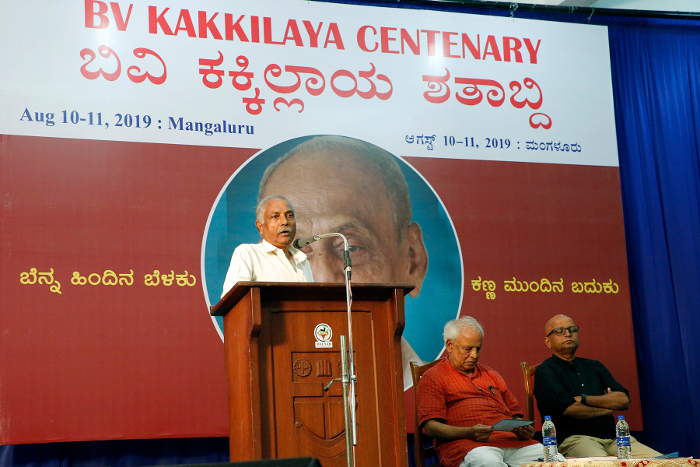
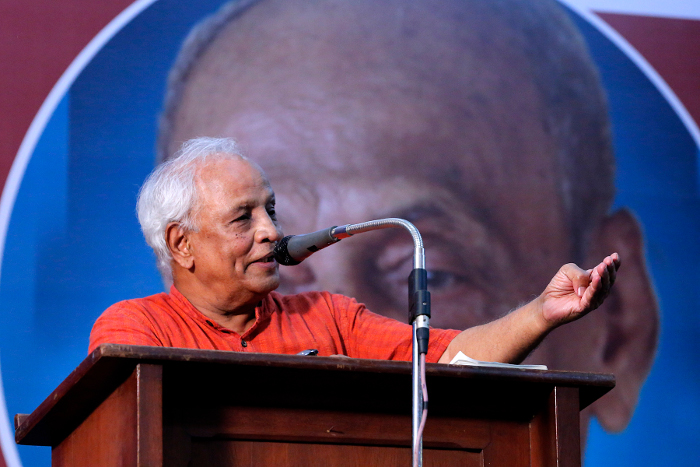
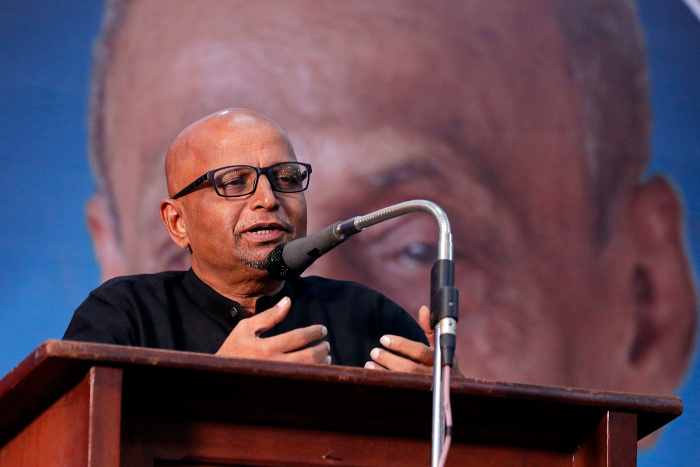
Prof. Anand Teltumbde and Dr. Kanhaiya Kumar addressed the next session on ‘Struggles of the Oppressed – Theory and Practice’. In his presentation, Prof. Teltumbde highlighted the fact that the final goal of the theories and calls for action of Marx and Ambedkar, as well as Buddha, was to emancipate the oppressed and to create a humane societal order free of all kinds of exploitation, although the means suggested were different. He stated that in the Indian context, there cannot be any successful class struggle without the struggle against caste discrimination, and called upon all the forces that are fighting against oppression to unitedly fight against caste, class and gender based discrimination and exploitation so as to create a humane society. In his reaction, Dr. Kanhaiya Kumar explained the genesis of the slogan Jai Bheem Lal Salaam and called upon the youth to unite and devise strategies to fight against all kinds of exploitation. The session concluded with interaction with the audience.
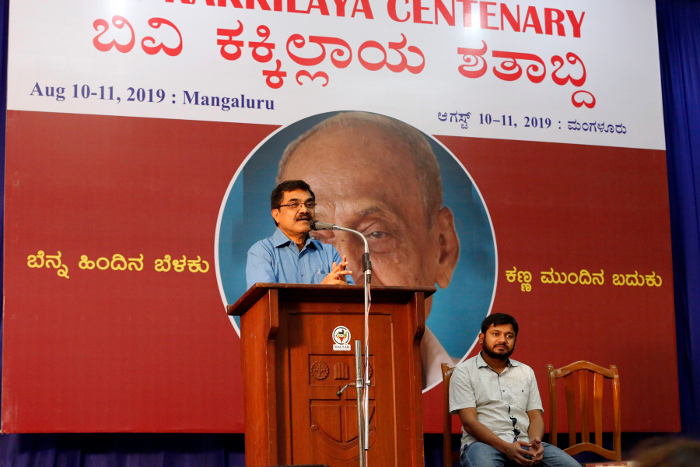
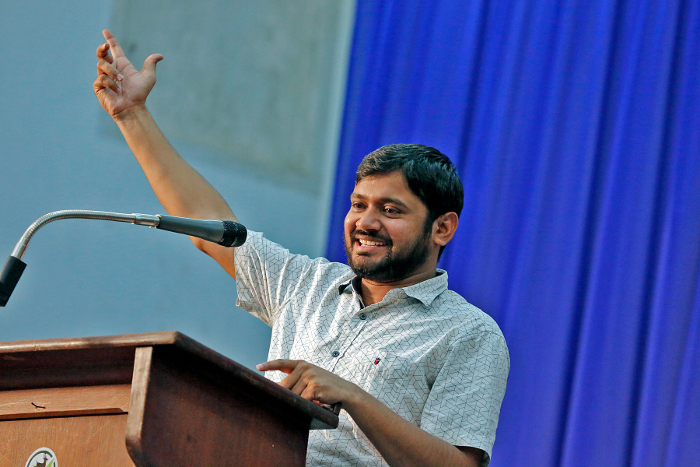
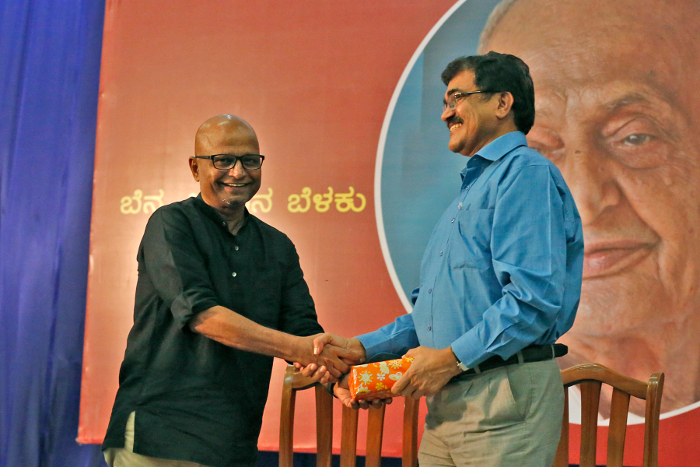
Members of IPTA, Karnataka presented cultural programme in the evening, captivating the audience. They also sang revolutionary songs interspersing the sessions throughout the day.
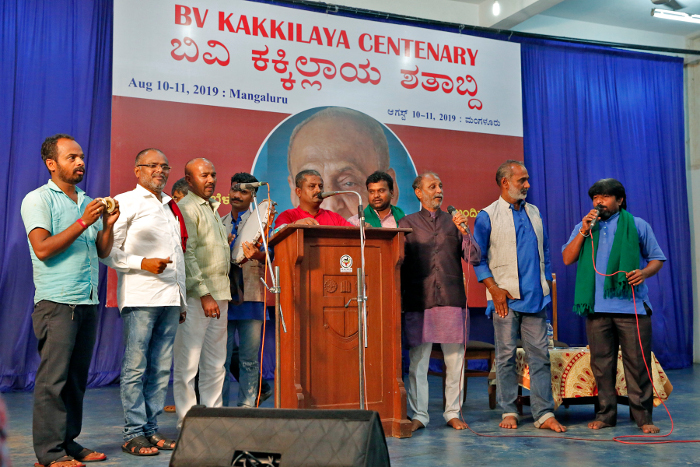
On the second day, Com. Dr. Siddanagouda Patil started the deliberations with a lecture titled ‘BV Kakkilaya – from Malabar to Karnataka Assembly’. Recalling the contributions of Com. BV Kakkilaya to the freedom struggle, Goa liberation struggle, Karnataka reunification movement, Dr. Patil highlighted the role played by him in organizing the AISF, AITUC, CPI, and his role as the first Rajya Sabha member from Karnataka in raising the issues of the poor and the marginalized and in strengthening the party and the mass struggles. He also recalled the contributions of Com. Kakkilaya in drafting the Karnataka Land Reforms Act. Dr. Patil also highlighted Com. Kakkilaya’s contribution as an award-winning writer in Kannada, and in founding and building Navakarnataka Publications. He reminded how, during his life devoted to the communist and trade union movements, Com. Kakkilaya born in a rich, upper caste, land lords’ family, would have had to live underground in the households of the poor workers of all castes and religions, sharing their food and lifestyles.
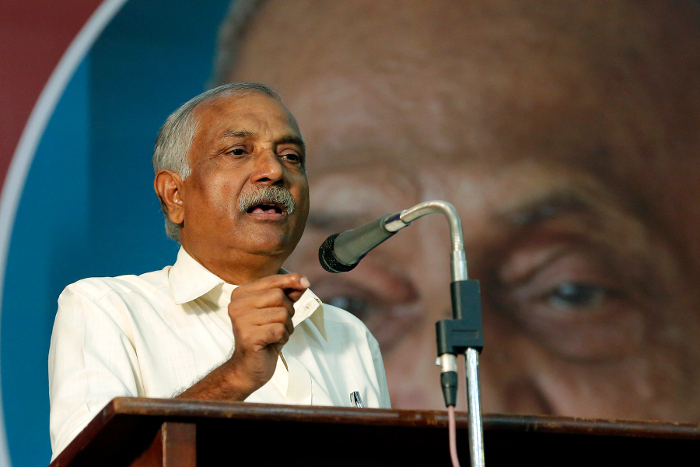
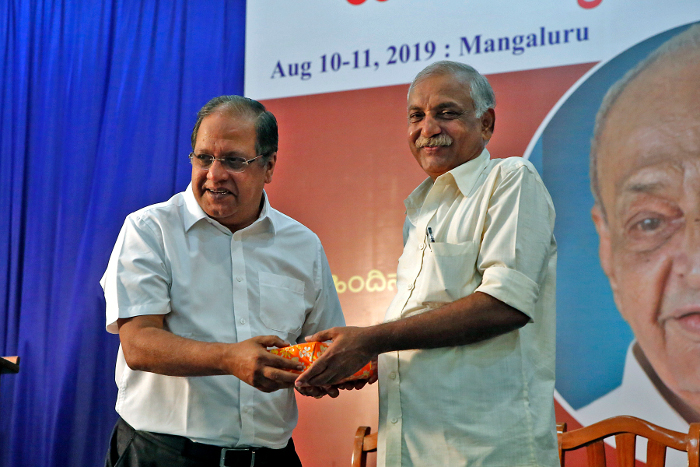
The first discussion on the second day was on the Past, Present and Future of Land Reforms in Karnataka. Prof. Chandra Poojary, Professor of Development Studies, Kannada University, Hampi, said that the land reforms movement indeed created a revolution by empowering the most backward sections of the society, and enabled the children of those families to gain education and liberation, himself being a beneficiary. He said that more than a lakh such families were benefited in Dakshina Kannada district alone. Prof. Chandra Poojary said that in the initial years, the communists as well as the Congress party gained immensely from the land reforms, with their leaders winning elections after elections; however, since the early 1990s, that has changed, and with the new generation growing up, the forces of communalism have made significant gains, almost completely wiping off the left, and sidelining the Congress. Sri Dinesh Mattu, senior journalist, stated that although his family too was a beneficiary of land reforms, the lands so got being small holdings, did not help the beneficiaries to a great extent but for empowering them as land owners, and many of them had to involve in other economically viable activities to sustain their lands and families. Sri Mattu felt that implementation of land reforms by late Devaraj Urs, the then CM of Karnataka was a ‘revolution in a hurry’ and also his choice of second line leaders for his party was also done in hurry, and both these contributed to the failure of the Congress party to fully encash on its land reforms programme. Com. PV Lokesh in his presidential remarks clarified on the valiant role played by the CPI and its cadres in forcing the congress government in Karnataka to implement the land reforms, and explained that the reasons for a more successful implementation in Karnataka compared to northern states was solely due to the active participation of the left cadres. Even In Karnataka, the tenants could get their lands wherever the cadres of the left helped them in the process, and elsewhere, the land lords and their strong arm tactics succeeded in dispossessing the tenants of their holdings. Com. Lokesh also drew attention to the fact that of the unclaimed or unconfirmed lands of the tenants that was taken over by the government, only about 38% have been distributed to the landless poor and the remaining are left uncultivated. Some of these have been occupied by the landless for unauthorized cultivation, as Bagar Hukum, and the regularization of such lands for the landless poor is a major issue that needs to be tackled urgently, said Com. PV Lokesh.
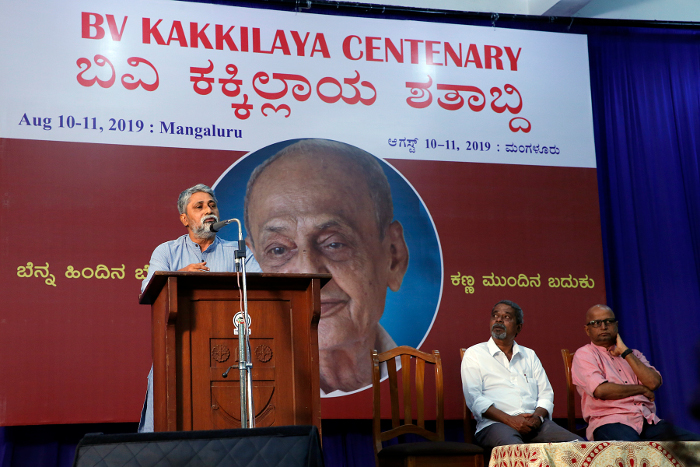
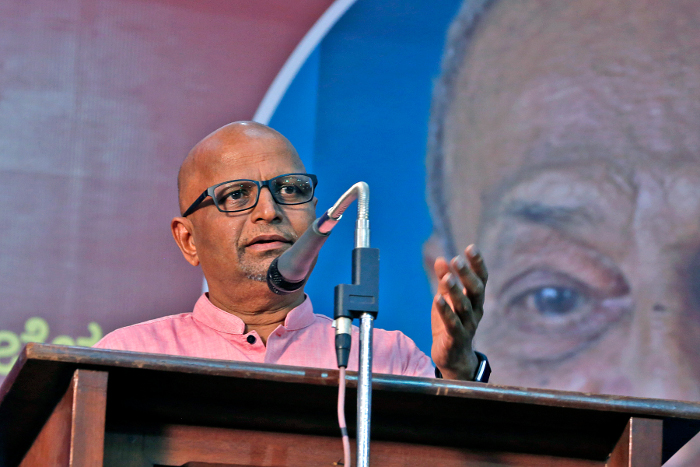
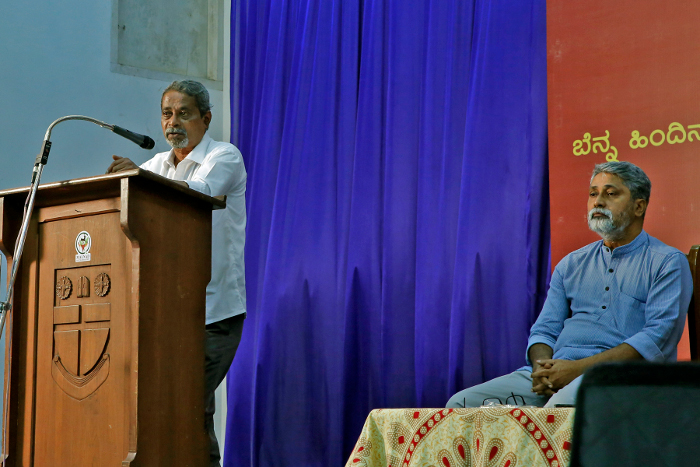
The second discussion for the day, in the afternoon, was titled ‘Writings in Kannada on Philosophy, History and Economics’. Dr. TS Venugopal, retired Professor of Statistics, spoke on the writings on philosophy, and appreciated the major contributions of Sri Debiprasad Chattopadhyay in bringing to the fore the philosophical literature of India, while also lamenting that hardly any original philosophical writings exist in Kannada. Dr. Vijay Thambanda, Professor of History at Kannada University, Hampi, traced the evolution of writings on history in Kannada whereas Sri Kalale Parthasarathy threw light on the writings on economics and political sciences. Dr. G Ramakrishna, who presided, spoke on the difficulties faced in bringing the leftist literature into Kannada, and said that the process of finding local terms for such vast literature in foreign languages is still under evolution.
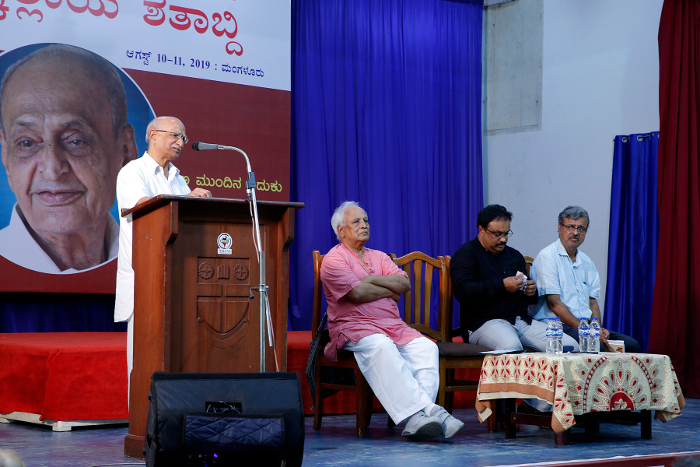
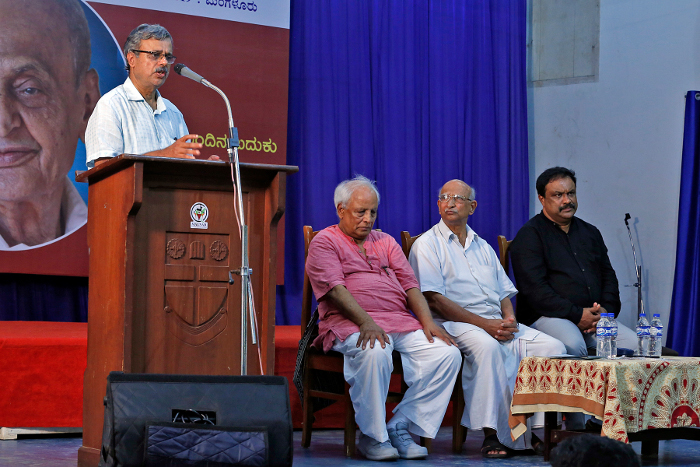
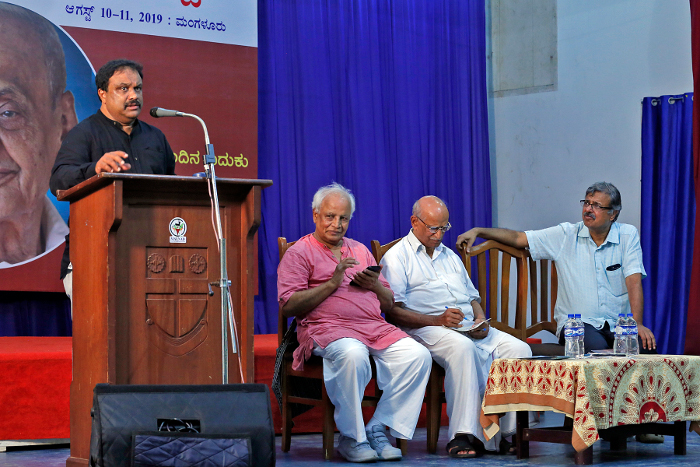
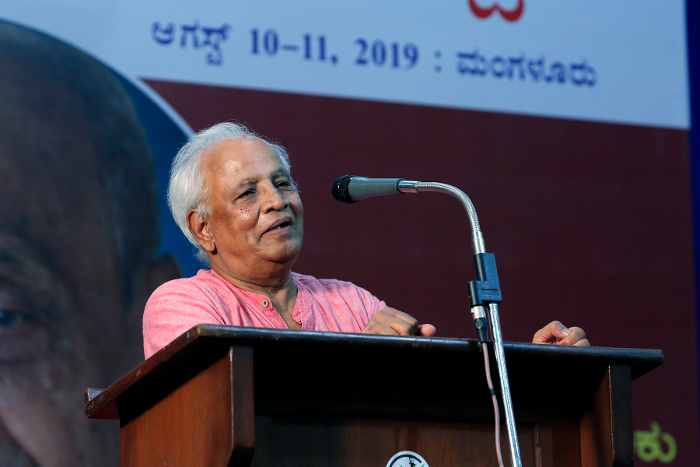
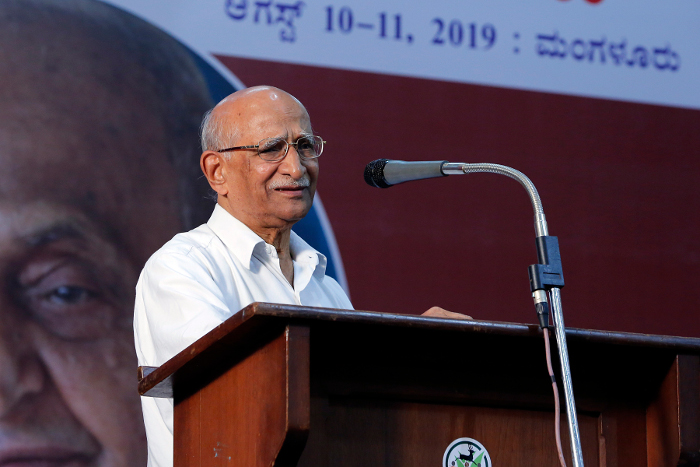
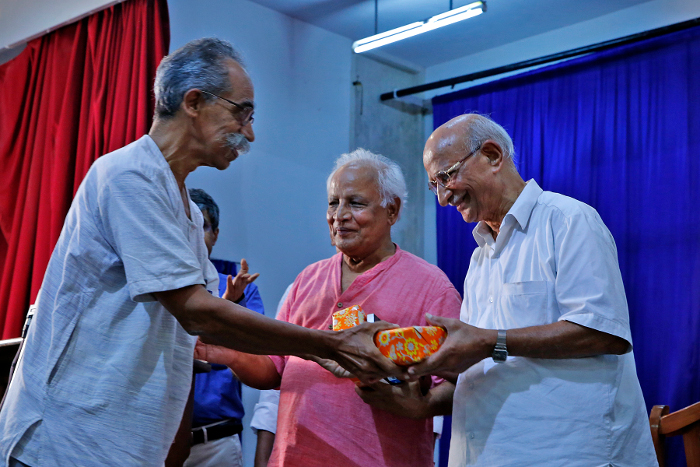
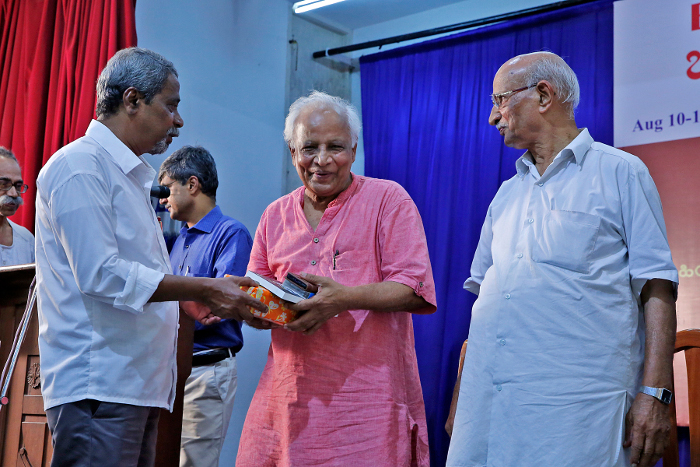
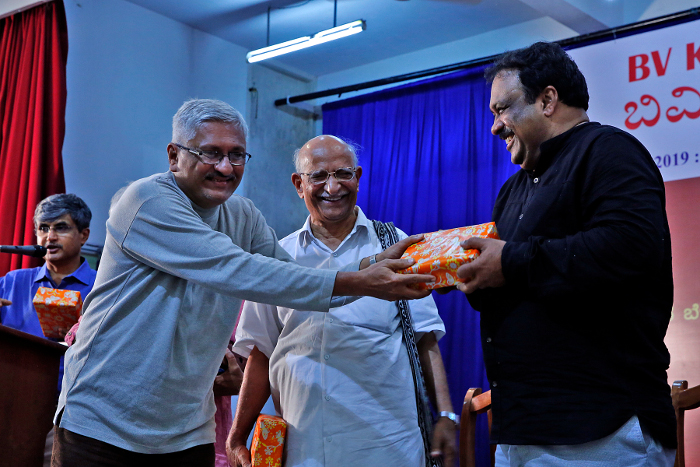
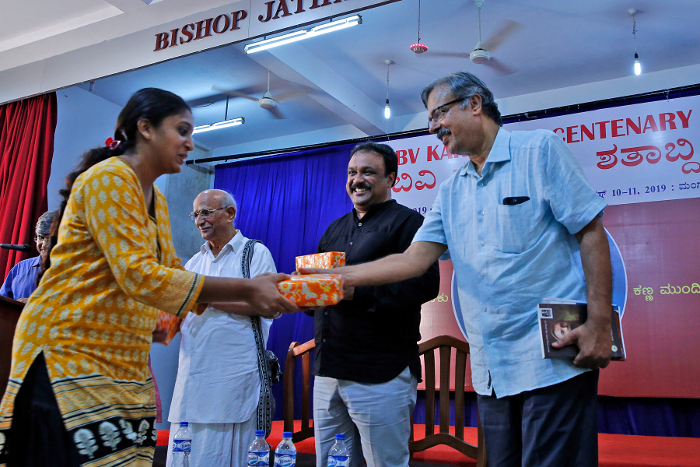
Sri TM Krishna, eminent Carnatic vocalist and writer, and Com, Noor Zaheer were the speakers in the next session titled Reshaping Art, which also happens to be the title of the book penned by Sri TM Krishna. Initiating the discussion, and speaking on Reshaping Art Beyond Caste, Sri TM Krishna pointed out that the origin of all forms of discrimination is with aesthetics, or the perception of beauty. He said that such perception is influenced by one’s physical appearance, color, accent, dialects, clothing, food, life style, job, caste, religion and so on, and such perceptive discriminatory tendencies are inculcated right from the households, going on everywhere such as class rooms, work places, places of performing arts etc. Terming western classical music as largely white music and Indian classical music as Brahminical music, Sri TM Krishna enumerated how the other forms of music and art, including visual arts, suffer from casteist discrimination and exclusion. He called upon the art enthusiasts to fight such discrimination from within and out, so as to allow the growth of every form of art and music beyond the shackles of caste. Speaking of the clampdown in Kashmir, Sri TM Krishna expressed his anguish over the homogenization of anger against the Kashmiri people in the rest of India. Com. Noor Zaheer spoke on Reshaping Art Beyond Gender and in her poetic style, narrated several instances of neglect of the many contributions of women to art and music, including religious, folk and even leftist politico-cultural organisations. She concluded by stating that if Habba Khatoon doesn’t reverberate on the Dal Lake, the lake would perish.
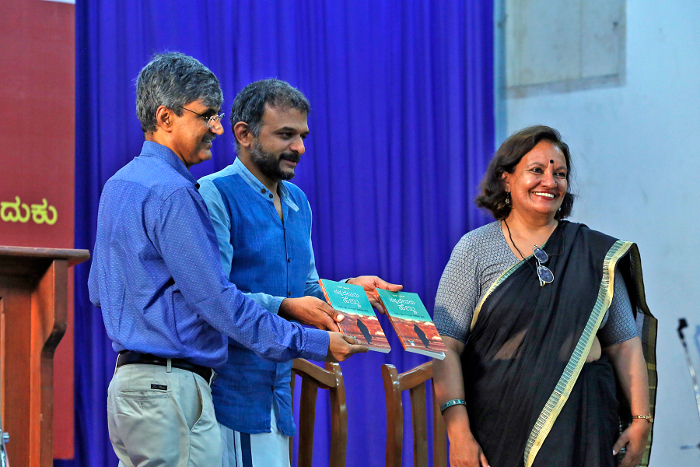
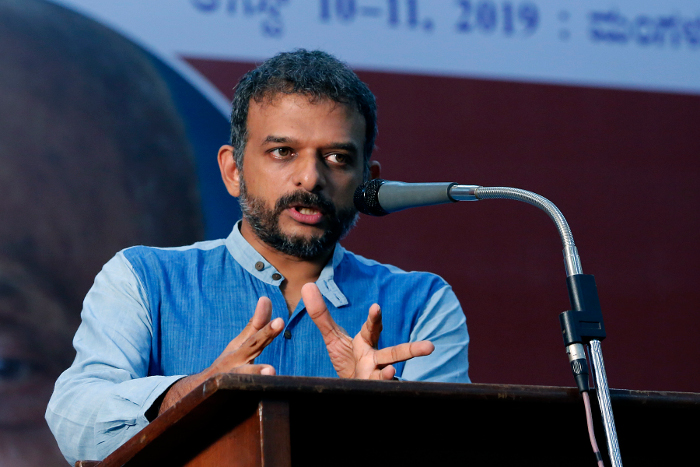
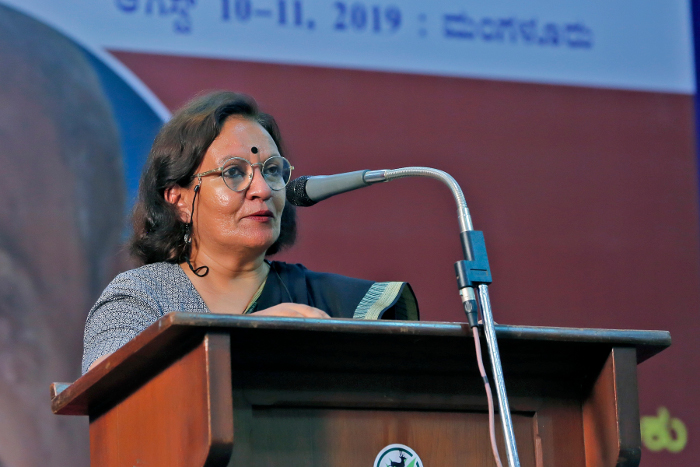
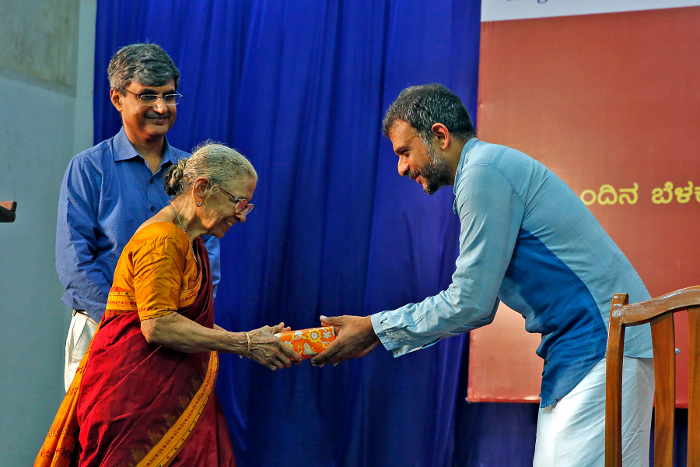
These sessions were followed by a brief valedictory function, presided over by Com. Janardhan, assistant secretary, CPI Karnataka. Com. BK Krishnappa, senior comrade from Mangalore who had known Com. BV Kakkilaya well, Com. Babu G of MS Krishnan Trust, Bengaluru, Com. V Kuckian, Secretary of Dakshina Kannada Commmittee of CPI, and Sri PV Mohan, Secretary of Congress Party, spoke about the contributions of Com. BV Kakkilaya.
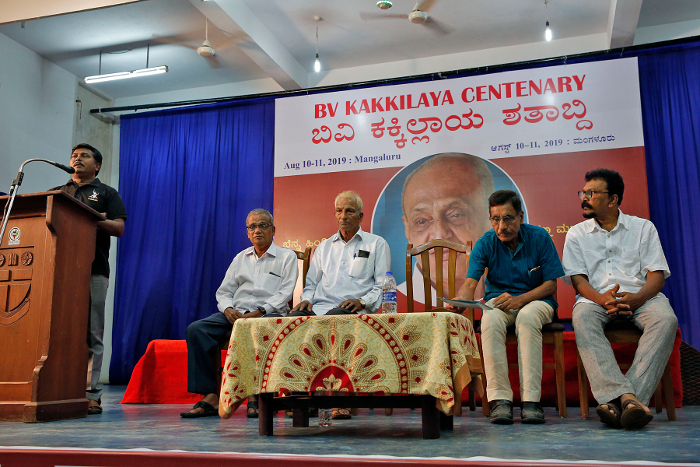
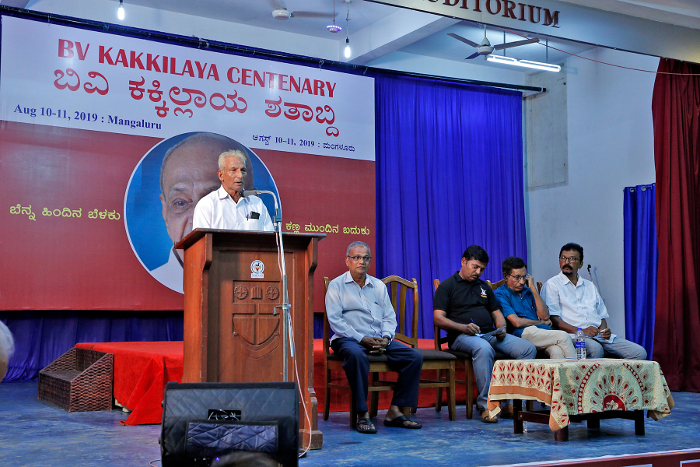
The two day event ended with a splendid vocal concert by Sri TM Krishna, making the tribute to Com. BV Kakkilaya a complete and meaningful one. Vidwan TM Krishna was very ably accompanied by Vidushi Akkarai Subhalakshmi on the violin and Vidwan Jayachandra Rao KU on the mridangam. All the songs that Sri TM Krishna had chosen for the occasion furthered the values like secularism, democracy, equality, multi-culturalism and diversity, for which Com. BV Kakkilaya had devoted his life as well. The opening shloka sung by Sri TM Krishna was on Jesus, which in fact had been composed by a Hindu, whose son, now living in the US, had sent it to Sri TM Krishna. In that verse the attributes of Christ were “One who heals all illness, relieves his devotees of all pains, he is ‘Lokahitakari,’ ‘one who is the personification of peace.’ Sri TM Krishna connected that verse to the composition of Sri Muttuswamy Dixitar’s “Sri Dakshinamoorthe” in Shankarabharana ragam, where similar attributes are used to describe Shiva. Shiva is ‘Shantamurthy,’ considered the ameliorator of the sufferings of his devotees. Next, he chose the composition of Kananda poet Kanakadasa, “Kulakulavennutiharu” which makes fun of the concept of purity and pollution, inferior and superior using the paradoxes like the lotus which is offered to god having blossomed in mud. Then came the Tamil Sufi song Allavai in Behag raga, which is sung in the Nagur Darga in Tamilnadu, which has a message of love and brotherhood. It was followed by the Vachana of Basavanna, 12th century philosopher and social; reformer of Karnataka, ‘Ullavaru Shivalayava Maduvaru’ in Kedaragowla raga, which subtly tells that by building temples one will destroy ‘Shiva,’ who cannot be static and enshrined in a temple, but is dynamic, a ‘Jangama,’ living in the hearts of people and not in the temples which are ‘sthavara and stationed in a place, indicating that stationary things are impermanent while those which are dynamic are permanent. The next was a Meera bhajan, ‘Pada Gunghuru nache’, wherein Meera defied the pressure of political power and social sanctions for realizing the values, which she cherished, the value of becoming a citizen in god’s city. He concluded the concert with a beautiful composition by Rabindranath Tagore ‘Aaguner Parashmoni Chhoao Praane,’ which speaks of purifying the life akin to gold which passes the test of fire and dispels all the darkness bringing the light shining.
Dr. Srinivas Kakkilaya, eldest son of Com. BV Kakkilaya, conducted the proceedings in an unconventional, simple style. The two day event had packed audiences, despite the torrential rains and flooding that cut-off Mangaluru from the rest of Karnataka. The threats and protests by fundamentalist organisations such as ABVP, Bajrang Dal, Shri Ram Sena, Hindu Jagaran Vedike etc., were also thwarted, with complete support from the police. The event also received wide coverage in the media, and some of the sessions were live streamed on the local cable networks.
The two-day programme was held at the Bishop Jathanna Auditorium, Sahodaya, Balmatta in the city and was jointly organised by Samadarshi Vedike, Mangaluru, Hosathu Monthly, Bengaluru, MS Krishnan Memorial Trust, Bengaluru and Navakarnataka Publications Private limited, Bengaluru. The event also marked 200 years of Karl Marx, 150 years of Mahatma Gandhi, 95 years of the CPI, 75 years of IPTA and 60 years of Navakarnataka Publications and a banner proclaiming so was displayed prominently on the stage.
Photos: Yajna, Mangaluru
Video: Shenoy Video, Mangaluru
Media Reports:
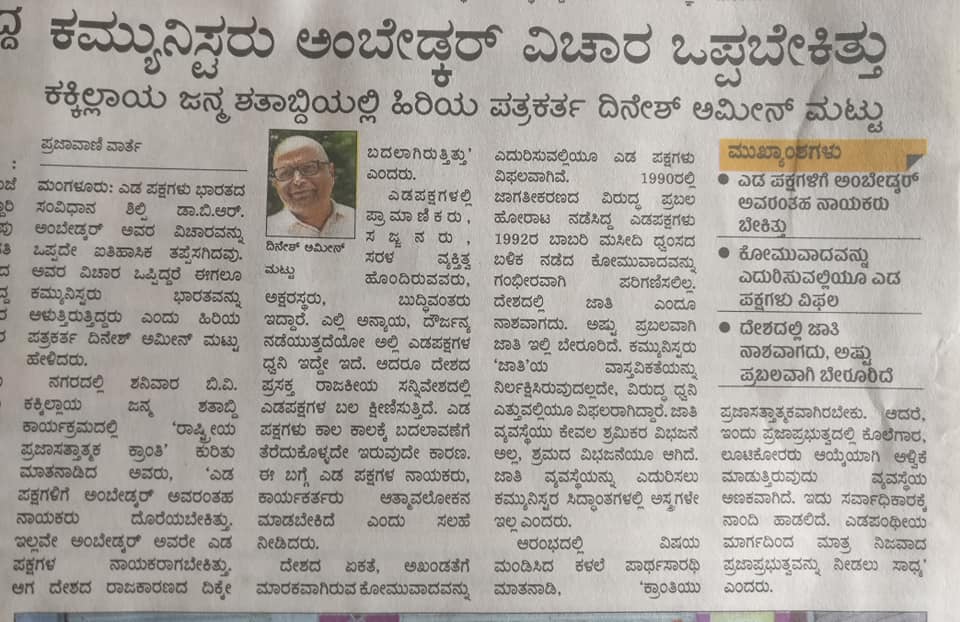
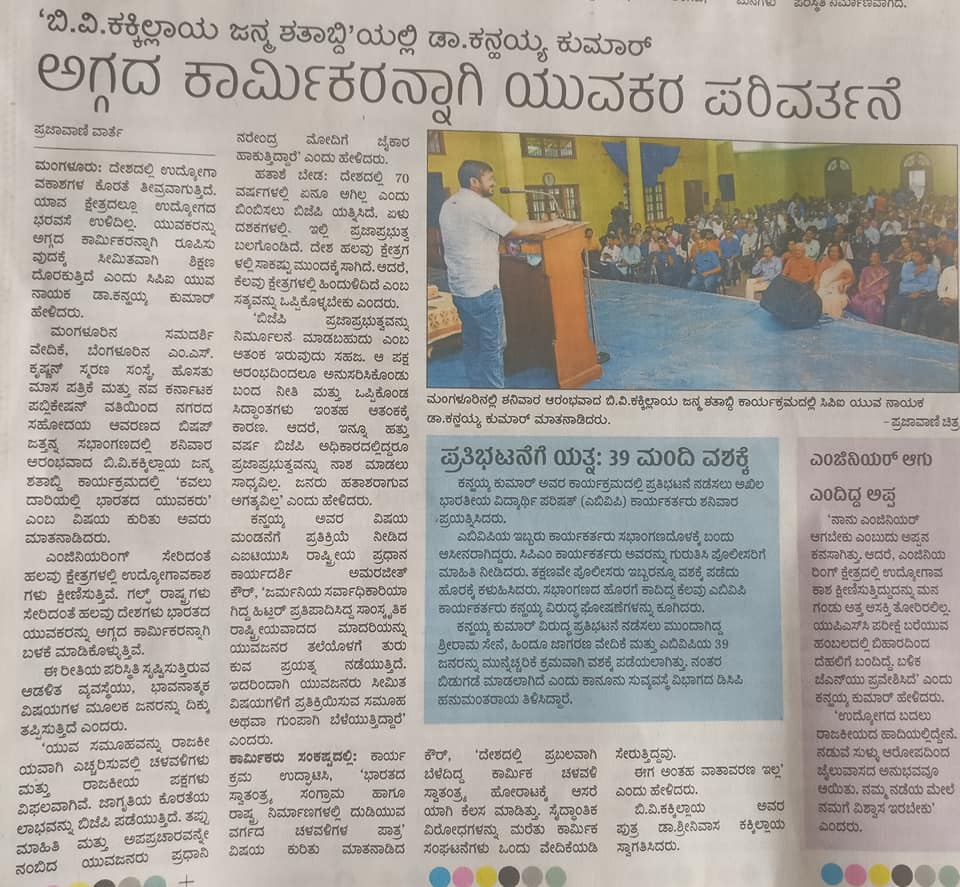
More links:
- Government neglecting interests of working class : Amarjeet Kaur: http://www.mangaloretoday.com/main/Government-neglecting-interests-of-working-class-Amarjeet-Kaur.html
- Attempts made to stall movement: Kanhaiya Kumar – https://www.deccanherald.com/state/mangaluru/attempts-made-to-stall-movement-kanhaiya-kumar-753565.html
- Stop patronising Modi, start questioning him: Kanhaiya – https://www.thehindu.com/news/cities/Mangalore/stop-patronising-modi-start-questioning-him-kanhaiya/article28979239.ece
- “The spirit of democracy is to question authority”: Kanhaiya Kumar at B V Kakkilaya Centenary – https://themanipaljournal.com/2019/08/12/the-spirit-of-democracy-is-to-question-authority-khanhaiya-kumar-at-b-v-kakkilaya-centenary/
- Mangaluru: Youth today are victims of propaganda – Dr Kanhaiya Kumar: https://www.daijiworld.com/news/newsDisplay.aspx?newsID=613697
- ‘Growth of India’s Youth has Gone Backward than Forward’ – AISF Leader Dr Kanhaiya Kumar – https://www.mangalorean.com/growth-of-indias-youth-has-gone-backward-than-forward-aisf-leader-dr-kanhaiya-kumar/
- Photo album: https://www.facebook.com/pg/MangaloreanNews/photos/?tab=album&album_id=2203823869721833
- ಸರಕಾರದ ಅಂಧಭಕ್ತಿಯೇ ದೇಶದ್ರೋಹ – https://www.prajavani.net/stories/national/kanhaiya-kumar-jnu-student-657247.html
- ರಾಮ ನಮ್ಮೂರಿನ ಅಳಿಯ, ಸೀತೆಯ ಊರು ನನ್ನದು: ಡಾ. ಕನ್ಹಯ್ಯ ಕುಮಾರ್ – https://www.prajavani.net/artculture/article-features/i-belongs-seetha-town-657299.html
- ಅಂಧಭಕ್ತಿ ಪ್ರದರ್ಶನವೂ ದೇಶದ್ರೋಹ: ಕನ್ಹಯ್ಯ ಕುಮಾರ್ – https://vijaykarnataka.indiatimes.com/state/karnataka/showing-devotion-to-one-government-which-is-also-anti-national-says-cpi-leader-kanhaiya-kumar/articleshow/70625822.cms
- ಸರ್ಕಾರವನ್ನು ಪ್ರಶ್ನಿಸಬೇಕೆ ಹೊರತು ವಿರೋಧ ಪಕ್ಷಗಳನ್ನಲ್ಲ: ಮಂಗಳೂರಿನಲ್ಲಿ ಕನ್ಹಯ್ಯ ಕುಮಾರ್ ಭಾಷಣ – https://www.naanugauri.com/dr-kannhiah-kumar-speech-in-mangalore-today-%E0%B2%85%E0%B2%B0%E0%B3%8D%E0%B2%A5%E0%B2%B6%E0%B2%BE%E0%B2%B8%E0%B3%8D%E0%B2%A4%E0%B3%8D%E0%B2%B0%E0%B2%A6-%E0%B2%AE%E0%B3%87%E0%B2%B2%E0%B3%86-%E0%B2%A7/
- https://www.newskarnataka.com/mangalore/kanhaiya-kumar-honours-dk-freedom-fighter-kakkilaya-on-birth-centenary
- ‘Fate of farmers has not improved much’: https://www.deccanherald.com/state/mangaluru/fate-of-farmers-has-not-improved-much-753945.html
- https://www.thehindu.com/news/national/karnataka/we-need-to-be-upset-with-homogenised-reaction-from-kashmir-tm-krishna/article29037103.ece (Sri TM Krishna has sugegsted a correction, that his statement should read as – we need to be upset about the homogenous response to what is happening in Kashmir from Indians in rest of the country)

